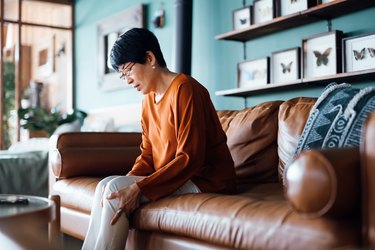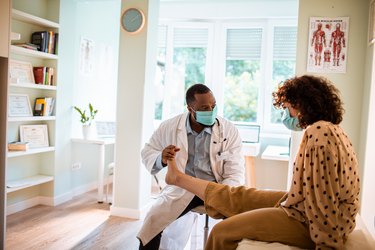
Notice your legs are feeling heavier than normal? Achiness isn't uncommon if you were on your feet for longer than normal or had an unusually active day. But if you consistently notice your legs feel heavy and swollen, you could be dealing with an underlying problem.
Legs that feel like lead weights may have several possible culprits. Some may be related to problems with your veins, according to Vincent Noori, MD, a vascular surgeon at The Vascular Center at Mercy Medical Center in Baltimore. Others are the result of swelling or simply pushing your body too hard.
Video of the Day
Video of the Day
Here's how to figure out what you might be dealing with and what you can do to make your legs feel lighter and more comfortable.
1. You Have Varicose Veins
You don't always feel varicose veins — those dark purple or blue veins that often appear as twists or bulges on the legs. But in some cases they can cause your legs to feel achy, heavy, uncomfortable or itchy, especially after sitting or standing for long stretches, according to the Mayo Clinic.
Varicose veins happen when weak or damaged valves cause blood to pool into veins, but they're not always serious and can often be managed with at-home measures.
Tip
Varicose veins are different from telangiectasia, or spider veins, which are groups of tiny blood vessels located close to the surface of the skin. Spider veins may be caused by aging or sun damage, and they're not usually a sign of a vein disorder.
2. It's Restless Legs Syndrome
Restless legs syndrome may not make your legs feel heavy, exactly, but it can create uncomfortable aching or throbbing sensations that only go away when you move your legs, per the National Institute of Neurological and Stroke Disorders.
The discomfort is most common at night while sitting or lying down. Restless legs syndrome relief often comes from lifestyle changes like moderate exercise, dietary changes and massage, because medications can become less effective over time.
3. You're Working Out Too Hard
It's not uncommon for your legs to feel tired while running, climbing steps or for a little while after a tough workout. But if they're consistently feeling heavy or stiff and tired, and you don't feel refreshed even after resting, you could be dealing with overtraining syndrome (OTS).
OTS is marked by feelings of fatigue or burnout along with worsening performance and can happen to anyone when they don't take enough time to properly recover, per the National Academy of Sports Medicine. It's especially common in child and teen athletes, though, and it can increase the risk for injury.
4. You Have Lymphedema
Lymphedema is another common cause of heavy legs, Dr. Noori says, along with a feeling of tight, swollen skin that burns or itches.
The problem stems from the buildup of excess lymphatic fluid, which causes swelling and discomfort, according to the Cleveland Clinic. It can happen in the legs or arms.
Lymphedema most often occurs in people who have undergone surgery, radiation or chemotherapy, but in some cases people who are otherwise healthy can also be affected.
5. You're Dealing With Venous Insufficiency
If your legs feel heavy when you wake up, you might have venous insufficiency. This condition occurs when the veins have problems sending blood from the legs back to the heart.
"As the blood pools and the pressure builds, the patient can develop a number of symptoms, including leg heaviness," says Dr. Noori.
The condition might be caused by a past blood clot in the legs, per the National Library of Medicine (NLM), but you could also be at higher risk if you have obesity, are pregnant, have a family history or a history of deep vein thrombosis in the legs, are tall or tend to sit or stand for long periods of time.
The condition can also make your legs feel achy, itchy or swollen and cause skin to become irritated, red, crusted or weepy, per the NLM. It can often be managed at home, especially when it's caught early.
6. You're Carrying Excess Weight
Obesity can put extra pressure on your veins, which can increase the risk for problems like varicose veins and venous insufficiency.
People with obesity are more likely to experience lymphedema too, according to the Cleveland Clinic.
7. You're Dealing With a Spinal Condition
Back pain paired with legs that feel heavy, numb or weak may be a sign of spinal stenosis.
This degenerative condition, which most often affects adults over 60, happens when age-related wear-and-tear causes the spinal canal to narrow, per the American Academy of Orthopaedic Surgeons (AAOS). This narrowing can cause pain or weakness in the back and legs.
The condition is often managed with medication, physical therapy or steroid injections, but in some cases surgery may be needed.
8. You Have Peripheral Artery Disease
About 6.5 million U.S. adults have peripheral artery disease (PAD), where plaque buildup in the arteries causes vessels that carry blood from the heart to the legs to become more narrow. This can cause pain and leg weakness with walking that tends to ease up when you rest, along with leg hair loss, smooth or shiny leg skin, sores that don't heal and cold or numb toes, per the Centers for Disease Control and Prevention.
There's no cure for PAD, but aspirin or cholesterol-lowering medications may help lower your risk of complications, as can eating a healthy diet and reducing your intake of saturated fats, trans fats, sugars and sodium.
Are There Any Deficiencies That Cause Heavy Legs?
Certain vitamin and mineral deficiencies may cause leg pain, such as too-low levels of vitamin D, magnesium and vitamin B12. But there are no deficiencies specifically linked to a feeling of heaviness in the legs.
Does COVID-19 Affect Your Legs?
As with many viral infections, you may develop pain in your legs if you have COVID-19, according to the AAOS. The pain is typically felt in the muscles, but if you have an arthritic joint, the virus may make the pain there worse. Muscle weakness is also being investigated as a potential side effect of COVID, per the National Library of Medicine, but it's too soon to say whether COVID causes weakness in the legs.
Treatment for Heaviness in the Legs

Getting rid of a heavy or achy feeling in your legs often means addressing the underlying cause (in other words, seeing your doctor). But there are steps you can take to manage your discomfort in the meantime.
Dr. Noori recommends:
- Wear compression stockings. Compression socks or stockings gently squeeze your legs to help blood move through your veins more efficiently. They can be useful to reduce or prevent swelling, particularly for vein-related problems like venous insufficiency.
- Elevate your legs. Propping your legs on a pillow can help pooled blood or fluids move away from the legs and ease swelling.
- Get moving. Being active can encourage better circulation and blood flow too. If your legs feel heavy after sitting or standing in one place for a long time, take a walk or try these simple exercises.
- Cut back on your sodium intake. Salt or sodium causes your body to retain more water. That can increase swelling, including in your legs.
- Lose excess weight. Reaching a healthy weight can reduce your risk for problems that can contribute to leg heaviness, including lymphedema, varicose veins and venous insufficiency.
When to See a Doctor for Legs That Feel Heavy
You should let your provider know if leg heaviness is making it harder to perform your normal activities.
"If leg heaviness is impacting a patient's quality of life despite conservative measures, they should speak to a doctor to see what other options are available," Dr. Noori says.
Seek medical attention, too, if your leg symptoms get progressively worse, or if you experience sudden, severe swelling or pain, prolonged bleeding or develop wounds or sores. These could be signs of serious health problems..
- Mayo Clinic: "Varicose Veins"
- National Institute of Neurological and Stroke Disorders: "Restless Legs Syndrome Fact Sheet"
- National Academy of Sports Medicine: "19 SIGNS OF OVERTRAINING: HOW TO AVOID EXCESS FATIGUE AND OTS"
- Cleveland Clinic: "Lymphedema"
- National Library of Medicine: "Venous Insufficiency"
- American Academy of Orthopaedic Surgeons: "Lumbar Spinal Stenosis"
- Centers for Disease Control and Prevention: "Peripheral Arterial Disease (PAD)"
- National Library of Medicine: "Muscle Weakness in COVID-19 Patients (MIOCOVID)"
- American Academy of Orthopaedic Surgeons: "Can the Cornonavirus Affect My Bones and Joints?"
Is this an emergency? If you are experiencing serious medical symptoms, please see the National Library of Medicine’s list of signs you need emergency medical attention or call 911.